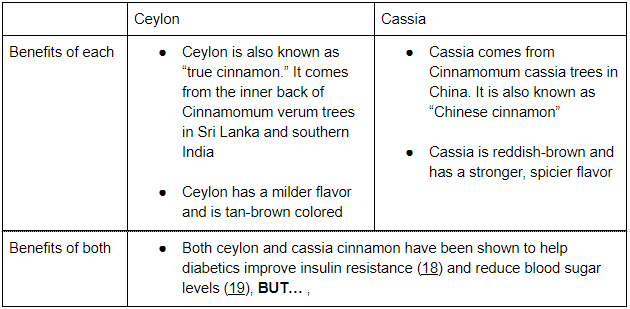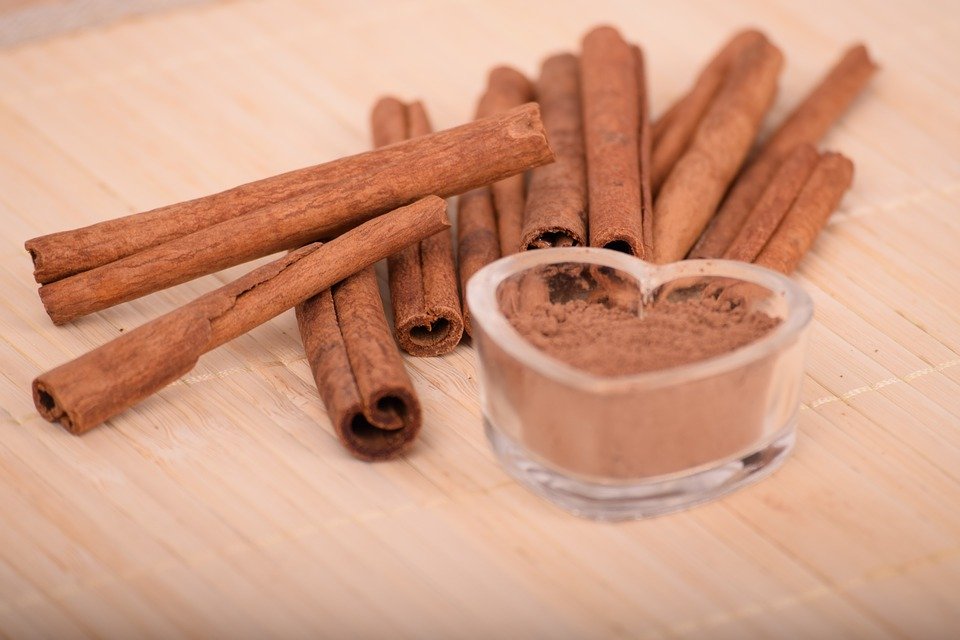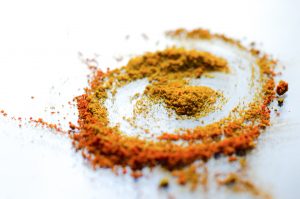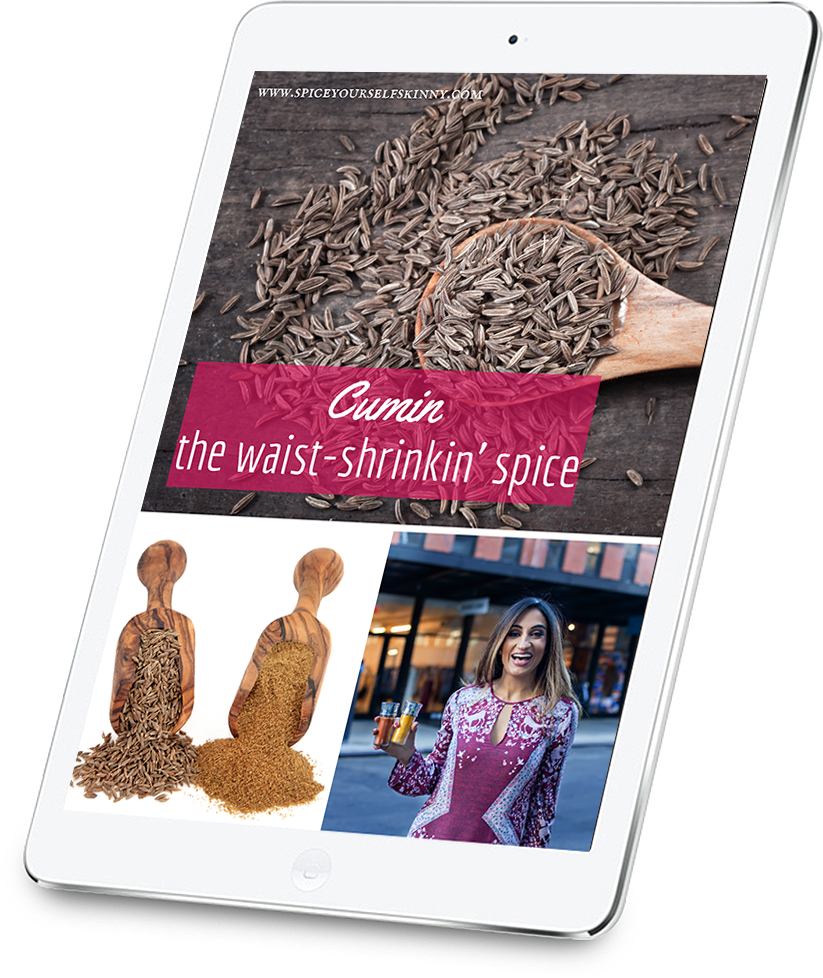I smile as I tap the small, glass cinnamon spice jar over my cup of morning coffee. A dash or two of my favorite sweet spice takes my daily coffee from something I enjoy to pure indulgence. Although the benefits of adding cinnamon to coffee are generally known, the specific health benefits of cinnamon are often not! It can strengthen and tone the body in so many ways.
It almost makes you feel like you’re getting away with something when you add cinnamon to your drinks and dishes. It has such an exciting, tempting flavor but it’s also incredibly good for you.
Not all cinnamon is the same. There are different kinds of cinnamon, one of them is excellent for your health and another can actually damage your health! In this article, I’ll tell you everything you need to know about which cinnamon to choose and how much is safe.
Here’s what I’ll cover in this post:
- Three health benefits of cinnamon
- Ceylon Cinnamon vs Cassia: Which is safer and how much to use?
- Cinnamon allergies
- Cinnamon and safety for pregnancy, breastfeeding and small children
- How to use cinnamon and delicious cinnamon tea recipes (new one with honey and lime!)
But first, let’s start with all the incredible health benefits of cinnamon. There are so many!
What is cinnamon? Ceylon cinnamon vs cassia
Cinnamon is a spice that’s obtained from the inner bark of certain tree species.
But did you know there are different kinds of cinnamon? It’s not just a subtle difference in taste that differentiates them.
The two most common types of cinnamon are ceylon and cassia. Here are some major differences between them.

There is one BIG difference between Ceylon and cassia cinnamon.
You see, cassia cinnamon contains a compound called coumarin, which can be toxic in large doses. This is important for you, especially if you’re wondering, “Is cinnamon good for kidneys?”
The thing is:
Coumarin has been linked to kidney, liver and lung damage or even cancer in rodents. Unfortunately, there are also isolated incidents of similar negative effects in humans (3). Too much cassia cinnamon could actually supply carcinogens (which can lead to cancer) in humans. Coumarin might worsen (or cause) liver or kidney damage. If you have a kidney or liver condition, avoid cinnamon and check with your doctor about whether it’s safe for you at all.
That said, cinnamon can have plenty of health benefits. Let’s take a look.
What are the health benefits of cinnamon?
There are so many different ways to enjoy this powerful spice. You can enjoy cinnamon sprinkled on your coffee, fruit, salads, even veggies, and meat.
The 4 weight loss benefits of cinnamon
Can cinnamon help lose belly fat?
Some research confirms this. You see, cinnamaldehyde, the essential oil that gives cinnamon its unique spicy-sweet flavor, was studied for its effects on obesity. Scientists noticed an increase in fat metabolism and certain genes causing thermogenesis (5), an activation of fat-burning processes in the body. It targets belly fat in particular, which is a major problem spot for many women, and is linked to serious health problems (6).
The health benefits of cinnamon also include making the body more sensitive to insulin (7), which helps prevent extra fat storage.
More importantly, though, this also helps protect your body against diabetes and can help diabetics manage their blood sugar levels (8) to stay healthier. Another way cinnamon benefits you is by mimicking the sweetness of sugar, without wreaking havoc on your glucose levels.
In fact, it improves them! When you replace sugar and sweet drinks with cinnamon, you help your blood sugar stabilize, avoid excess fat storage and satisfy your sweet tooth. You get to enjoy a gentle spicy sweet taste and all the sweet benefits that come along with it.
Plus, cinnamon has other health benefits. Here they are:
1. Cinnamon benefits for skin
Cinnamon does have antimicrobial properties (10) and it is used in wound-healing. However, there is not enough scientific evidence to support that cinnamon would be beneficial for skin conditions.
In fact, cinnamon used on skin can cause burns on skin, even if you’re not allergic to cinnamon.
2. Cinnamon benefits for a flu
Does cinnamon kill viruses? According to research by the New York School of Career and Applied Studies (11), cinnamon was found to be effective in deactivating viruses in some organisms.The findings were based on a diet that includes one or two tablespoons of cinnamon a day.
There is some limited research to back this up. (12)
Either way, cinnamon can be a nice addition in your tea to kick your cold.
3. Antioxidants in cinnamon
Cinnamon has the third-highest antioxidant content (13) compared to other antioxidant-rich herbs and spices — only cloves and allspice contain more.
A study in Nutrition Journal showed that the health benefits of cinnamon come from powerful natural antioxidants and the prevention of dangerous oxidation of lipids in foods. This fights free radicals, which is a well-known way to prevent cancer.
Some research even suggests that cinnamon has anti-tumor properties to prevent further cancer growth and “can decrease the chances of metastasis or the spread of cancer through tumorous growth (14).”
(Note that there is no clear evidence that cinnamon is a cure for cancer. These are only individual research findings.)
Get your own downloadable Cinnamon Spice PDF with the sweet spice that helps you get off of sugar. (You also get my late-night sweet & slimming tea recipe!)
My strategies have helped busy women lose 40 pounds and beyond, shed their belly fat, and finally feel good in a bikini.
Another benefit of zapping free radicals is minimizing age spots (15) and other signs of aging that show on the face. It’s antimicrobial properties also make cinnamon a great way to treat acne (16). It also slows the growth of bacteria (17) causing the common cold, the flu, and other illnesses.
The health benefits of Cinnamon also include improved blood flow and blood clot prevention. All of these things help reduce your risk of heart disease and stroke (8). Who knew a sweet little spice could have such a big impact?!
4. Anti-inflammatory benefits of cinnamon
Inflammation is natural in the body. It’s your natural defense against foreign invaders and helps the body heal itself. However, inflammation can become a problem when it’s chronic (long-term) and directed against the body’s own tissues (18). This can happen with autoimmune diseases such as multiple sclerosis (MS). Studied for its effects on MS, researchers found that cinnamon seems to have anti-inflammatory effects on the central nervous system (19). This could reduce symptoms and help the body and mind function better.
According to some research findings, cinnamon’s anti-inflammatory properties also help improve cholesterol (20), lower the risk of heart disease, and slow brain function decline. Reducing heart disease risk factors such as high blood pressure and high triglyceride levels (21) are another incredible example of the health benefits of cinnamon.
It might even lower “bad” LDL cholesterol and maintain “good” HDL cholesterol levels in the blood. Studies have also found the anti-inflammatory compounds in cinnamon could be used for treatment or prevention of inflammation-related neurodegenerative diseases such as Parkinson’s and Alzheimer’s diseases.(22)
As if cinnamon wasn’t doing enough, its antiviral, antifungal (18), and antiseptic properties boost immunity (23) and help your body fight common infections.
Get your own downloadable Cinnamon Spice PDF with the sweet spice that helps you get off of sugar. (You also get my late-night sweet & slimming tea recipe!)
My strategies have helped busy women lose 40 pounds and beyond, shed their belly fat, and finally feel good in a bikini.
Benefits of cinnamon tea
One of the benefits of cinnamon tea is that it makes it easy for your digestive system to absorb all the nutrients and healthy compounds from cinnamon. This means you’ll start seeing the benefits sooner.
I have three easy, delicious cinnamon tea recipes in my article Cinnamon tea to reshape your body.
You can also get specific ideas on how to get more cinnamon every day with my Sweet Spice cheat sheet.
It includes my Cinnamon, Ginger and Honey tea called, “Fire Tea” because it fires away your belly fat. You see, the benefits of cinnamon and honey are extra powerful when you combine them, and they also taste amazing together.
Here’s another wonderful cinnamon tea recipe, from Thrift and Spice, with an unexpected ingredient, lime! I’ve never had cinnamon tea with lime before, and I absolutely love it. She recommends using only a cinnamon stick, not ground cinnamon.
Whichever you choose, I would highly recommend using Ceylon cinnamon, not Cassia. Especially since cinnamon tea is more potent than just eating it, you want the highest quality and healthiest option available.
And if you’re wondering, “What is the best time to drink cinnamon tea?”, the answer is simple.
As it’s safe to consume cinnamon in small amounts every day, you can have a cup of cinnamon tea in the morning, afternoon, or evening. I like to have it in the afternoon to soothe any sugar cravings.

Cinnamon Tea with Honey and Lime
Ingredients
- 4 cups water
- 1 (Ceylon) cinnamon stick (or ¼ teaspoon ground ceylon cinnamon)
- honey (raw is best)
- 1/4 of a lime
Instructions
- Bring water to a boil.
- Break cinnamon stick into pieces and place in water.
- Remove from heat and steep for at least 15 minutes.
- Strain the tea into a mug.
- Add about 1 tsp of honey to the mug.
- Add the lime juice to the mug and stir.
How to use cinnamon
It would be fairly easy to have too much coumarin if you are consuming a lot of Cassia cinnamon. More than 1 teaspoon could bring someone over the daily limit. Therefore, if you eat a lot of cinnamon on a regular basis or take a cinnamon supplement, only use Ceylon cinnamon, not Cassia. Ceylon cinnamon is safer, but still a powerful herb. (24) Test starting with lower amounts and see what agrees with you. A sprinkle here or there throughout your day is perfectly safe.
Cinnamon side effects
I’ll give you the symptoms that could warn you if you have a cinnamon allergy. If you have certain health conditions, you might want to get the ok from your doctor before adding a lot of cinnamon to your diet. I’ll let you know what those are and talk about other situations where you might want to be cautious about consuming cinnamon, like during pregnancy and breastfeeding.
Cinnamon is generally safe for most people in small amounts. But cinnamon isn’t for everyone. The benefits of ground cinnamon don’t outweigh the effects of cinnamon allergies. Around 2 percent of people with food allergies are allergic to spices, and of those, cinnamon is a common spice allergy. (25)
Possible cinnamon allergic reaction:
You may have an allergy to cinnamon if you experience these symptoms (25) after having it:
- A runny nose
- Eyes itch and water
- Skin rash
- Insomnia
- Shortness of breath
- Upset stomach
- Hives
- Slightly swollen throat, tongue, or lips
Your doctor can do allergy testing to determine your tolerance for cinnamon. You may only be allergic to one type of cinnamon such as cassia, whereas Ceylon cinnamon (25) would be ok. Your doctor will be able to tell you if this is the case.
What to consider when eating cinnamon
Medication Interference: Cinnamon is a powerful spice. In fact, it could even interfere with medicine for diabetes (26) or other medications to help you manage your blood sugar levels.
It also has blood-thinning effects. If you’re taking any prescription blood thinners, such as anticoagulants (like warfarin) or anti-platelets (such as aspirin), cinnamon may negatively interact with these. (27)
Talk to your doctor about adding cinnamon to your diet, and be sure to mention any other herbal or over-the-counter supplements you’re taking. Cinnamon could also interfere with prescription antibiotics. So if you’re taking a round of antibiotics, leave the cinnamon on the shelf until you’re done with your medicine.
Cinnamon and Hormones
Cinnamon could potentially impact your hormone levels. If you’ve had any hormone-dependent condition or cancer, ask your doctor before adding cinnamon to your spice drawer (28).
Cinnamon and Pregnancy
Cinnamon is generally safe during pregnancy in the regular amounts you would get in food. But medicinal doses like capsules or essential oils could potentially increase miscarriage risk by increasing blood flow to the uterus and possibly contractions (29).
There’s not a lot of scientific research to back this up. But to be on the safe side, avoid large doses of cinnamon in early pregnancy and talk to your doctor about how much cinnamon is safe while you’re pregnant.
Breastfeeding is another time where you’ll want to ask your doctor if cinnamon will be ok. If your doctor says cinnamon is fine, start with a small amount of cinnamon and monitor your baby for any of the above signs of cinnamon allergy. Exposing a newborn to cinnamon through breast milk could possibly trigger an allergy.
Cinnamon and Babies/Toddlers
Sometimes babies and small children might experience irritation, burning or even swollen lips, mouth and tongue. Especially if the child has a cinnamon allergy.
When a child is at least 6 months to 1 year old, try testing just a little pinch or two of cinnamon in their food. If you notice any of the signs of allergy, wait until they’re older to try cinnamon. If they seem fine, it’s probably okay for them to have up to half a teaspoon a day.
For extra caution, ask your pediatrician when might be a good time to introduce cinnamon to your child, and start with small amounts. But they’ll probably just tell you what I did.
Over to you!
There you have it! Now you know what the health benefits of cinnamon are and how you can use this power spice.
I’d love to hear from you:
What’s your favorite way to use cinnamon?
Let me know in the comments below.
Get your own downloadable Cinnamon Spice PDF with the sweet spice that helps you get off of sugar. (You also get my late-night sweet & slimming tea recipe!)
My strategies have helped busy women lose 40 pounds and beyond, shed their belly fat, and finally feel good in a bikini.



































I LOVE cinnamon!!! Thanks for all the amazing information on this!! Ceylon is the best, yes!!
When making the Fire Tea, can I used ground cinnamon and ginger?
You can use ground cinnamon and ginger if it’s available more easily. The cinnamon stick really tastes lovely though and the real ginger has more digestion benefits. I like to make a batch for 3-5 days all at once to save time. However, making it with ground ginger/cinnamon is so much better than not making it at all!
Awesome! Thanks so much!!